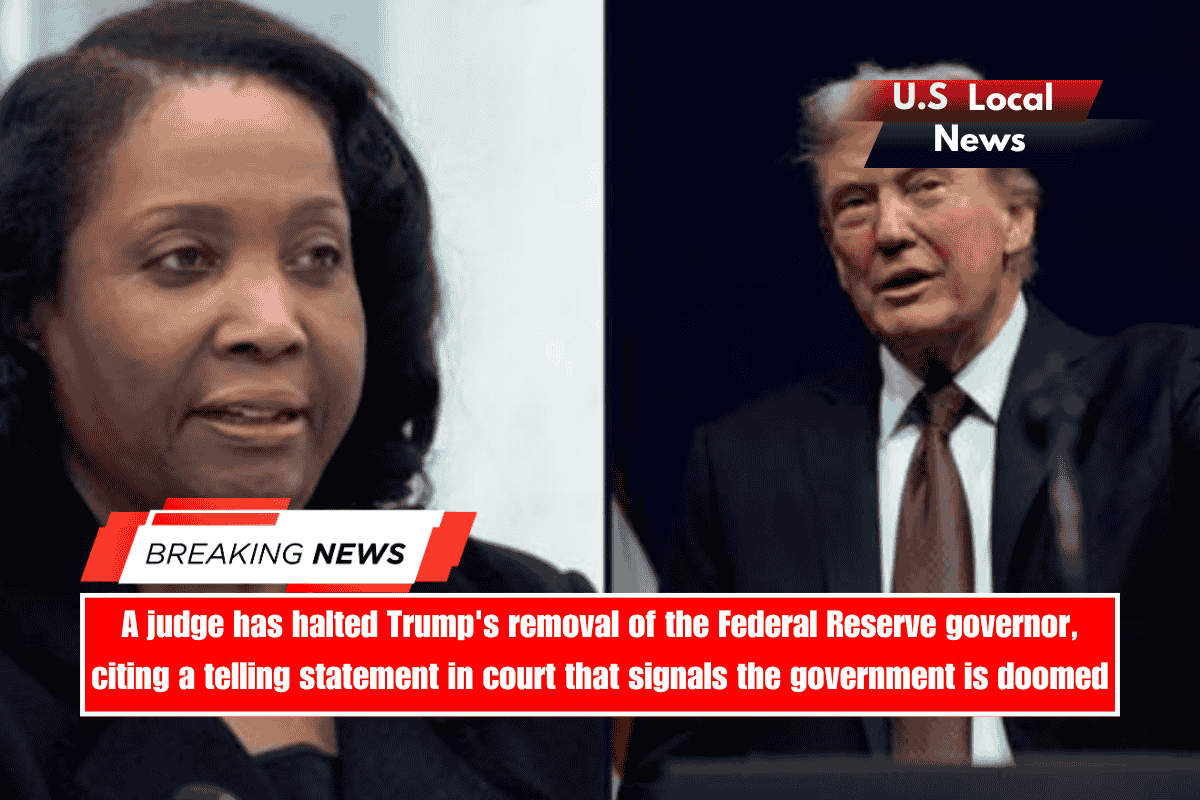Lisa Cook persuaded a federal judge in Washington, D.C., a few weeks after a Federal Reserve Board governor sued to prevent her firing by Donald Trump, that mortgage fraud allegations dating back before her time in office do not meet the “for cause” standard for removal.
U.S. District Judge Jia Cobb, a 2021 appointee of President Joe Biden, began her ruling in Cook’s favor by noting the case’s groundbreaking nature — that it is a “first impression” — and ended the ruling by pointing out that this is the “first” attempted “‘for cause’ removal of a Federal Reserve Board Governor[.]”
Cook, a Biden appointee who began her 14-year term in 2023, and her high-profile attorney Abbe Lowell have, at least for now, successfully argued that, regardless of the disputed mortgage fraud allegations, federal law shows that the “best reading of the ‘for cause’ provision is that the bases for removal of a member of the Board of Governors are limited to grounds concerning a Governor’s behavior in office and whether they have been faithfully and effectively executed.”
“‘For cause’ thus does not contemplate removing an individual purely for conduct that occurred before they began in office,” Cobb wrote, adding that inefficiency, neglect of duty, and malfeasance in office (INM) generally constitute cause for independent agency firings like this one. Furthermore, the Court finds that the removal likely violated Cook’s procedural rights under the Fifth Amendment’s Due Process Clause. She has also demonstrated irreparable harm as a result of her removal.
Lowell and Cook had claimed in court filings that the DOJ’s preferred definition of cause — “any articulable justification that the President deems sufficient to warrant removal” — “cannot be right,” as could the claim that Cook received adequate due process. The judge agreed on both counts and granted Cook a temporary restraining order, which the court interpreted as a preliminary injunction to prevent the firing for the time being.
“The Court believes Cook is highly likely to succeed on at least two of her claims. First, the Court believes Cook is likely to succeed in her claim that President Trump violated the Federal Reserve Act because her alleged removal did not meet the statute’s ‘for cause’ requirement,” Cobb stated. “Second, the Court finds Cook likely to succeed on her claim that the purported removal deprived her of procedural rights guaranteed by the U.S. Constitution.”
Although the judge stated that Cook is “likely not correct that ‘for cause'” and the standard of inefficiency, neglect of duty, and malfeasance in office are “perfectly synonymous,” the Trump administration did itself no favors by supporting a “any articulable justification” standard.
If the administration’s argument is correct, it would be “tantamount to being able to fire for policy disagreement, which the Government has admitted the President cannot do,” Cobb wrote, before indicating her ruling is not controversial.
“The Government’s argument that a rule that does not take into account pre-confirmation conduct will lead to a parade of horribles also ignores that this is precisely the line that Congress has drawn in dozens of statutes over the past century,” the judge wrote. “Pre-confirmation conduct has never been used as a basis for removal for officers who were protected by the INM by Congress. The Court is not breaking new ground in interpreting the Federal Reserve Act’s ‘for cause’ provision in light of this historical context.”
More Law&Crime coverage: Chief Justice Roberts just put a 90-year-old precedent on the brink of allowing Trump to fire an FTC commissioner, for now — and Lisa Cook should take notice.
In conclusion, Cobb determined that “permissible cause for removal” of Cook and similar officials “extends only to concerns about the Board member’s ability to effectively and faithfully execute their statutory duties, in light of events that have occurred while they are in office.”
Furthermore, the judge ruled that Trump’s decisions to fire Cook are reviewable by the courts and that the administration’s arguments to the contrary would result in a “absurd result” because Federal Reserve Board members would essentially be removable at will, even for minor policy disagreements that the DOJ itself has stated could not be “cause” for firing:
Finally, taken to its logical conclusion, the Government’s argument leads to an absurd result: While admitting that the President cannot remove an official for policy disagreements, the Government claims that under Reagan, a removal on the grounds of a policy disagreement would nevertheless be unreviewable. This cannot be the case. Such a rule would provide no practical insulation for the members of the Board of Governors. It would mean that the President could, in practice, “remove a member . . . merely because he wanted his own appointees on the” Board of Governors. Here, there is a disagreement between the Parties about the interpretation of a federal statute. The Court is exercising its appropriate role in resolving this dispute..
Next, the judge included two caveats in the footnotes. First, she argued that the decision was reached without “inquiring into the sufficiency” of the mortgage fraud evidence “presented by President Trump.” Second, Cobb did not address Cook’s claim that her firing was motivated by pretext. Nonetheless, she determined that Trump had a “legally impermissible reason for firing Cook” by referring “only to allegations regarding Cook’s conduct before she began serving on the Federal Reserve Board”—conduct that “may have occurred before she was confirmed to her position.”
Neither the criminal referral posted on social media by Federal Housing Finance Agency Director Bill Pulte nor Trump’s immediate call for her resignation provided adequate notice and opportunity to respond to the allegations before her firing, according to the judge, who concluded Cook “likely did not receive any due process in her removal[.]”
In conclusion, Cobb refused to grant the Trump administration a stay pending appeal and issued an injunction directing Federal Reserve Chair Jerome Powell and the Board of Governors to “allow Cook to continue to operate as a member of the Board for the pendency of this litigation.”
Lowell and Cook attorney Norm Eisen said in a statement that Cobb’s decision “recognizes and reaffirms the importance of safeguarding the Federal Reserve’s independence from illegal political interference.”
“Allowing the president to unlawfully remove Governor Cook on unsubstantiated and vague allegations would endanger the stability of our financial system and undermine the rule of law,” their lawyers said. “Governor Cook will continue to carry out her sworn duties as a Senate-confirmed Board Governor member.”
It’s possible that the Trump administration will file an appeal notice soon.









